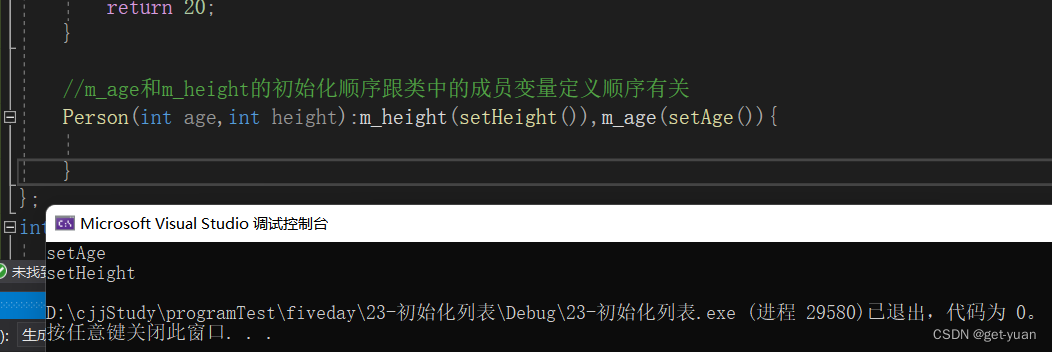成员访问权限
成员访问权限、继承方式有3种:
- public:公共的,任何地方都可以访问(struct默认)
- protected:子类内部、当前类内部可以访问
- private:私有的,只有当前类内部可以访问(class默认)
子类内部访问父类成员的权限,是以下两项种权限最小的那个:
- 成员本身的访问权限
- 上一级父类的继承方式
开发中用的最多的继承方式是public,这样能保留父类原来的成员访问权限
访问权限不影响对象的内存布局
初始化列表
一种便捷的初始化成员变量的方式
#include<iostream>
using namespace std;
struct Person
{
int m_age;
int m_height;
/*Person(int age, int height) {
m_age = age;
m_height = height;
}*/
Person(int age, int height) :m_age(age), m_height(height) {
}
};
int main() {
Person person(18, 180);
return 0;
}只能在构造函数种使用
初始化顺序只跟成员变量的声明顺序有关

初始化列表与默认参数配合使用
//分开写,默认参数只能写在函数声明中
struct Car
{
int m_age;
int m_height;
Car(int age = 0, int height = 0);
};
//初始化列表只能写在函数实现中
Car::Car(int age, int height) :m_age(age), m_height(height) {}如果函数声明和实现是分离的:
- 初始化列表只能写在函数的实现中
- 默认参数只能写在函数的声明中
构造函数的互相调用
#include<iostream>
using namespace std;
struct Person
{
int m_age;
int m_height;
Person():Person(0, 0) {
}
//Person(){
// //相当于创建了一个临时的Person对象
// Person(0, 0);
//}
Person(int age, int height) {
m_age = age;
m_height = height;
}
};
int main() {
Person person;
cout << person.m_age << endl;
cout << person.m_height << endl;
return 0;
}父类的构造函数
- 子类的构造函数默认会调用父类的无参构造函数
- 如果子类的构造函数显示地调用了父类的有参构造函数,就不会再去默认调用父类的无 参构造函数
- 如果父类缺少无参构造函数,子类的构造函数必须显示调用父类的有参构造函数